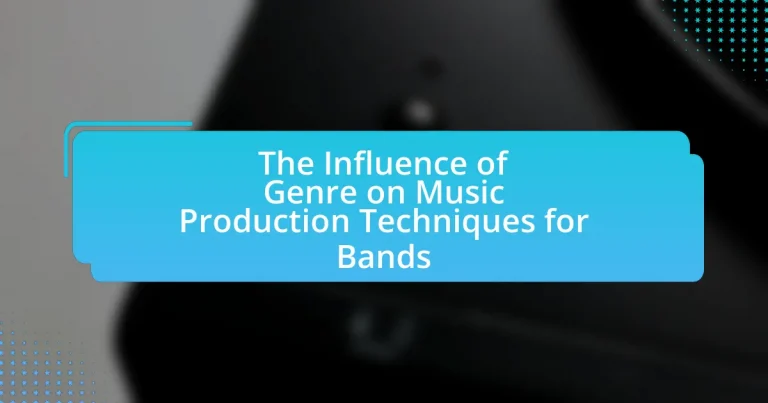The article examines the significant influence of music genre on production techniques utilized by bands. It outlines how different genres dictate specific recording, mixing, and mastering approaches, highlighting examples such as rock, electronic, hip-hop, and classical music. The discussion includes the defining characteristics of various genres, the impact of genre on sound and audience expectations, and the importance of understanding genre for music producers. Additionally, it addresses the challenges bands face when switching genres and offers best practices for genre-specific production, emphasizing the role of technology and collaboration with specialized producers in enhancing sound quality and authenticity.

What is the Influence of Genre on Music Production Techniques for Bands?
The influence of genre on music production techniques for bands is significant, as different genres dictate specific approaches to recording, mixing, and mastering. For instance, rock bands often utilize live tracking to capture the energy of performances, while electronic music producers may rely heavily on software and digital manipulation to create sounds. Additionally, genres like hip-hop emphasize sampling and beat-making, which requires distinct production techniques compared to genres such as classical, where orchestration and arrangement take precedence. These genre-specific techniques are supported by industry practices; for example, the use of analog equipment is prevalent in vintage rock recordings, while modern pop often employs auto-tuning and digital effects to achieve a polished sound.
How does genre shape the overall sound of a band?
Genre shapes the overall sound of a band by defining the stylistic elements, instrumentation, and production techniques used in their music. For instance, rock bands typically emphasize electric guitars and strong rhythms, while jazz ensembles often feature improvisation and complex harmonies. The genre dictates not only the musical structure but also influences the emotional tone and lyrical themes, as seen in country music’s storytelling approach compared to the introspective nature of indie music. This relationship between genre and sound is supported by studies showing that genre classification can predict musical characteristics, such as tempo and key signatures, which further solidifies the impact of genre on a band’s overall sound.
What are the defining characteristics of different music genres?
Different music genres are characterized by distinct elements such as rhythm, melody, harmony, instrumentation, and lyrical themes. For example, rock music typically features strong guitar riffs, a steady backbeat, and often explores themes of rebellion, while jazz is defined by its improvisational style, complex harmonies, and use of instruments like the saxophone and trumpet. Hip-hop is characterized by rhythmic vocal delivery known as rapping, sampling from other songs, and a focus on lyrical storytelling. Classical music is distinguished by its orchestral arrangements, adherence to formal structures, and often conveys a wide range of emotions through intricate compositions. Each genre’s unique characteristics influence the production techniques used by bands, shaping how music is created and performed.
How do these characteristics influence production choices?
Characteristics of a music genre, such as instrumentation, rhythm, and vocal style, significantly influence production choices by dictating the techniques and tools used in the recording process. For instance, genres like rock often require the use of live instruments and analog recording techniques to capture an authentic sound, while electronic genres may prioritize digital production methods and synthesizers to create unique textures. Additionally, the genre’s typical audience expectations shape decisions regarding mixing and mastering, ensuring that the final product aligns with listener preferences. This relationship is evident in the production of pop music, where polished vocals and catchy hooks are emphasized, leading producers to utilize auto-tuning and layered harmonies to meet commercial standards.
Why is understanding genre important for music producers?
Understanding genre is crucial for music producers because it informs their creative decisions and production techniques. Different genres have distinct characteristics, including instrumentation, song structure, and production styles that influence how music is created and perceived. For instance, a producer working in hip-hop will prioritize rhythm and beats, while a producer in classical music will focus on orchestration and dynamics. This knowledge allows producers to effectively tailor their work to meet audience expectations and industry standards, ultimately enhancing the commercial viability of their projects.
What role does genre play in audience expectations?
Genre significantly shapes audience expectations by establishing a framework of conventions and norms that listeners anticipate. For instance, a rock genre typically leads audiences to expect electric guitars, strong rhythms, and themes of rebellion, while a classical genre sets expectations for orchestral arrangements and structured compositions. Research indicates that these genre-specific cues influence how audiences interpret and engage with music, as they rely on familiar patterns to form their listening experience. This alignment between genre and expectation is supported by studies showing that listeners often prefer music that adheres to established genre conventions, reinforcing the importance of genre in shaping audience perceptions and experiences.
How can genre knowledge enhance a producer’s creativity?
Genre knowledge enhances a producer’s creativity by providing a framework for understanding the conventions, structures, and emotional resonances specific to different musical styles. This understanding allows producers to innovate within established boundaries, blending elements from various genres to create unique sounds. For instance, a producer familiar with both hip-hop and classical music can incorporate orchestral arrangements into a hip-hop track, resulting in a fresh and compelling fusion. Research indicates that familiarity with genre conventions can lead to more effective decision-making in production, as producers can draw on a wider array of techniques and influences, ultimately enriching the creative process.
What are the common production techniques associated with various genres?
Common production techniques vary significantly across music genres, reflecting their unique characteristics and audience expectations. For example, in pop music, techniques such as vocal layering, pitch correction, and the use of synthesizers are prevalent to create polished and catchy tracks. In contrast, rock music often employs techniques like live recording, dynamic mic placement, and analog equipment to capture a raw, authentic sound.
Hip-hop production frequently utilizes sampling, beat-making with drum machines, and heavy bass lines to establish rhythm and groove. Electronic music genres, such as house and techno, rely on sound design, looping, and effects processing to create immersive soundscapes.
These techniques are not arbitrary; they are rooted in the historical context and cultural significance of each genre, influencing how music is produced and consumed. For instance, the use of sampling in hip-hop emerged from the genre’s origins in DJ culture, where artists would loop sections of existing tracks to create new compositions.
How do production techniques differ between rock and pop music?
Production techniques in rock music typically emphasize live instrumentation and raw sound, while pop music production often focuses on polished, electronic elements and studio manipulation. Rock music frequently utilizes techniques such as multi-tracking of live instruments, natural reverb, and analog recording methods to capture an authentic sound, as seen in classic albums like Led Zeppelin’s “IV.” In contrast, pop music production leans towards digital production tools, heavy use of synthesizers, and vocal processing techniques like Auto-Tune, exemplified in tracks by artists like Taylor Swift. This distinction highlights the contrasting priorities of authenticity in rock versus commercial appeal and accessibility in pop.
What unique techniques are used in electronic versus acoustic genres?
Electronic genres utilize techniques such as sampling, synthesizing, and digital audio manipulation, while acoustic genres primarily rely on live instrumentation and natural sound production. In electronic music, sampling allows artists to incorporate pre-recorded sounds, creating new compositions, while synthesizers generate sounds electronically, offering a wide range of tonal possibilities. Digital audio manipulation enables effects like reverb and distortion, enhancing the sound further. In contrast, acoustic genres emphasize the authenticity of sound through instruments like guitars, pianos, and drums, focusing on performance dynamics and the organic quality of the music. This distinction highlights the fundamental differences in production approaches, with electronic music favoring technology and acoustic music prioritizing traditional methods.

How do Bands Adapt Their Production Techniques Based on Genre?
Bands adapt their production techniques based on genre by altering their recording methods, instrumentation, and mixing styles to align with the characteristics of each genre. For instance, rock bands often emphasize live recording techniques to capture the energy of performances, while electronic music producers may rely heavily on digital software and synthesizers to create soundscapes. Additionally, genres like hip-hop utilize sampling and beat-making techniques that differ significantly from the orchestration found in classical music. The adaptation is evident in the use of specific equipment; for example, jazz bands might prioritize high-fidelity microphones to capture nuanced performances, whereas pop artists may focus on polished production with vocal tuning software. These variations in production techniques are essential for achieving the desired sound that resonates with the audience of each genre.
What factors influence a band’s choice of production techniques?
A band’s choice of production techniques is influenced by genre, artistic vision, budget, and available technology. Different genres have distinct production norms; for example, electronic music often relies on digital production tools, while rock may emphasize live recording techniques. The artistic vision of the band dictates how they want their sound to be represented, leading to specific choices in production methods. Budget constraints can limit the options available, affecting the quality and type of equipment used. Additionally, advancements in technology can provide new tools and techniques that influence production choices, allowing bands to experiment and innovate within their genre.
How does the band’s identity affect their production decisions?
A band’s identity significantly influences their production decisions by shaping their sound, style, and overall artistic direction. For instance, a band that identifies with a specific genre, such as punk rock, will prioritize raw, unpolished production techniques to align with the genre’s ethos, often opting for live recordings and minimal editing. This approach is supported by the historical context of punk music, where bands like The Ramones and Sex Pistols embraced a DIY aesthetic, reflecting their identity and resonating with their audience. Consequently, the band’s identity not only dictates the technical aspects of production but also informs the emotional and thematic content of their music, ensuring authenticity and connection with listeners.
What external influences shape a band’s production style?
External influences that shape a band’s production style include technological advancements, cultural trends, and industry standards. Technological advancements, such as the introduction of digital audio workstations and new recording equipment, allow bands to experiment with sound and production techniques. Cultural trends, including shifts in musical tastes and societal movements, impact the themes and styles bands choose to explore in their music. Industry standards, driven by market demands and successful production practices, guide bands in their approach to recording and producing music, ensuring they remain competitive and relevant.
How do collaborations with producers impact genre-specific techniques?
Collaborations with producers significantly enhance genre-specific techniques by integrating diverse expertise and innovative approaches tailored to particular musical styles. Producers often bring specialized knowledge of genre conventions, such as the use of specific instrumentation, arrangement styles, and production methods that resonate with the target audience. For instance, in hip-hop, producers like Dr. Dre have utilized sampling and beat-making techniques that define the genre, while in rock, producers like Rick Rubin have emphasized raw sound and live recording techniques to capture the essence of the music. This collaboration allows artists to refine their sound, adopt new techniques, and ultimately create music that aligns with genre expectations while also pushing creative boundaries.
What are the benefits of working with genre-specialized producers?
Working with genre-specialized producers enhances the quality and authenticity of music by leveraging their deep understanding of specific musical styles. These producers possess extensive knowledge of genre-specific techniques, trends, and audience expectations, which allows them to tailor the production process effectively. For instance, a producer specializing in hip-hop is likely to have expertise in beat-making and sampling, ensuring that the final product resonates with the target audience. Additionally, genre-specialized producers often have established networks within the industry, facilitating collaborations and opportunities that can elevate a band’s visibility and reach. This targeted approach ultimately leads to a more polished and relevant sound, increasing the likelihood of commercial success.
How can producer-bands dynamics change the final sound?
Producer-band dynamics can significantly alter the final sound by influencing creative decisions, arrangement choices, and technical execution. For instance, a producer’s vision can shape the genre’s characteristics, such as the use of specific instruments or production techniques that align with a particular style. Historical examples include how producers like Phil Spector employed the “Wall of Sound” technique, which transformed the sonic landscape of pop music in the 1960s, demonstrating that the collaborative relationship between producers and bands directly impacts the overall sound quality and genre representation.
What are the challenges bands face when switching genres?
Bands face several challenges when switching genres, primarily including audience expectations, identity rebranding, and technical skill adaptation. Audience expectations can create resistance, as fans may prefer the band’s original sound and be reluctant to embrace new styles. Identity rebranding is crucial, as bands must redefine their image and marketing strategies to align with the new genre, which can lead to confusion or alienation among existing fans. Additionally, technical skill adaptation is necessary, as different genres often require distinct musical techniques, instrumentation, and production methods. For instance, a rock band transitioning to electronic music may need to learn new software and production techniques, which can be a steep learning curve. These challenges highlight the complexities involved in genre switching for bands, impacting their overall success and sustainability in the music industry.
How do bands maintain their core identity while exploring new genres?
Bands maintain their core identity while exploring new genres by integrating signature elements such as lyrical themes, vocal styles, and instrumental techniques that define their sound. For instance, when a band like Radiohead ventured into electronic music, they retained their distinctive atmospheric sound and introspective lyrics, which are hallmarks of their identity. This approach allows them to innovate within new genres while ensuring that their core essence remains recognizable to their audience. Additionally, bands often collaborate with producers who understand their foundational sound, further ensuring that any genre exploration aligns with their established identity.
What production hurdles arise when adapting to a new genre?
Adapting to a new genre presents several production hurdles, including the need for different technical skills, equipment, and creative approaches. Musicians and producers may struggle with unfamiliar instrumentation or production techniques specific to the new genre, which can hinder the overall sound quality and authenticity. For instance, transitioning from rock to electronic music requires proficiency in digital audio workstations and synthesizers, which may not be part of the original skill set. Additionally, the cultural context and audience expectations associated with the new genre can create pressure to conform, potentially stifling creativity. These challenges are evident in the music industry, where artists often face difficulties in successfully crossing over into genres that demand distinct stylistic elements and production methods.

What Best Practices Should Bands Follow for Genre-Specific Production?
Bands should tailor their production techniques to align with the specific characteristics of their genre. For example, rock bands often emphasize live instrumentation and dynamic mixing to capture the energy of performances, while electronic music producers may focus on sound design and layering to create intricate textures. Additionally, understanding genre-specific instrumentation is crucial; country bands might prioritize acoustic elements, whereas hip-hop artists often utilize sampling and beat-making techniques.
Moreover, adhering to genre conventions in arrangement and song structure can enhance listener engagement. For instance, pop music typically follows a verse-chorus format, while jazz may incorporate improvisation and extended solos. Utilizing genre-appropriate production tools and software, such as analog gear for vintage sounds in indie music or digital audio workstations for electronic genres, further supports the authenticity of the sound.
Research indicates that genre-specific production practices significantly influence listener perception and marketability, as seen in studies by the Berklee College of Music, which highlight the importance of aligning production choices with audience expectations.
How can bands effectively research their genre’s production techniques?
Bands can effectively research their genre’s production techniques by analyzing existing recordings, studying production credits, and utilizing online resources. By listening to a variety of tracks within their genre, bands can identify common production elements such as instrumentation, mixing styles, and effects used. Additionally, examining production credits on albums reveals the producers and engineers who specialize in that genre, providing insights into their techniques. Online platforms like YouTube, music production forums, and educational websites offer tutorials and discussions that break down genre-specific production methods, enhancing a band’s understanding of the technical aspects involved.
What resources are available for learning about genre-specific production?
Resources for learning about genre-specific production include online courses, textbooks, and industry workshops. Online platforms like Coursera and MasterClass offer courses tailored to specific genres, such as electronic music production or rock recording techniques. Textbooks such as “The Mixing Engineer’s Handbook” by Bobby Owsinski provide insights into genre-specific practices. Additionally, workshops hosted by music production schools or industry professionals often focus on particular genres, allowing hands-on experience and direct mentorship. These resources are validated by their widespread use in music education and professional development within the industry.
How can bands analyze successful tracks within their genre?
Bands can analyze successful tracks within their genre by examining key elements such as song structure, instrumentation, lyrical themes, and production techniques. By dissecting these components, bands can identify trends and characteristics that resonate with audiences. For instance, a study by Nielsen Music found that songs in popular genres often follow specific structures, such as the verse-chorus format, which enhances listener engagement. Additionally, analyzing the use of particular instruments or production styles prevalent in successful tracks can provide insights into the sound that appeals to fans within that genre. This methodical approach allows bands to adapt and innovate while remaining aligned with genre expectations.
What tips can enhance a band’s production quality within their genre?
To enhance a band’s production quality within their genre, bands should focus on utilizing genre-specific production techniques, investing in quality equipment, and collaborating with experienced producers. For instance, rock bands can benefit from layering guitar tracks to create a fuller sound, while electronic artists should prioritize sound design and mixing to achieve clarity and depth. Research indicates that high-quality microphones and audio interfaces significantly improve recording fidelity, which is crucial for all genres. Additionally, working with producers who understand the nuances of a specific genre can lead to more polished and authentic sound, as they can provide valuable insights into arrangement and mixing tailored to that genre’s standards.
How can bands utilize technology to improve their sound?
Bands can utilize technology to improve their sound by incorporating digital audio workstations (DAWs), advanced recording equipment, and sound processing software. DAWs like Pro Tools and Ableton Live allow bands to record, edit, and mix their music with precision, enabling them to experiment with various sounds and effects. Advanced recording equipment, such as high-quality microphones and audio interfaces, captures sound more accurately, enhancing the overall audio quality. Additionally, sound processing software, including plugins for equalization, compression, and reverb, enables bands to refine their sound and achieve a polished final product. These technological tools have been shown to significantly elevate the production quality of music, as evidenced by the widespread adoption of DAWs in professional studios, which has transformed music production practices across genres.
What common mistakes should bands avoid in genre-specific production?
Bands should avoid neglecting genre conventions in their production, as this can lead to a sound that feels disjointed or unprofessional. For instance, failing to incorporate specific instrumentation or production techniques typical of a genre, such as the use of reverb in shoegaze or the emphasis on rhythm in hip-hop, can alienate the target audience. Additionally, bands often make the mistake of not collaborating with producers who have expertise in their specific genre, which can result in a lack of authenticity and depth in the final product. Research indicates that adherence to genre-specific elements can significantly enhance listener engagement and satisfaction, as demonstrated by the success of artists who effectively align their sound with genre expectations.
What are the key takeaways for bands regarding genre influence on production?
Bands should recognize that genre significantly shapes production techniques, influencing everything from instrumentation to mixing styles. For instance, rock bands often prioritize live instrument recordings and dynamic mixing, while electronic artists may focus on synthesized sounds and digital manipulation. Historical data shows that genres like hip-hop utilize sampling and beat-making, which contrasts with the orchestration found in classical music. Understanding these distinctions allows bands to tailor their production approach, ensuring that their sound aligns with genre expectations and resonates with their target audience.
How can bands continuously evolve their sound while respecting genre conventions?
Bands can continuously evolve their sound while respecting genre conventions by integrating innovative elements and techniques that enhance their musical identity without straying too far from established norms. For instance, a rock band might incorporate electronic elements or unconventional song structures, which can refresh their sound while still adhering to the core characteristics of rock music. Historical examples include Radiohead, who blended alternative rock with electronic music, maintaining their genre roots while pushing creative boundaries. This approach allows bands to attract new audiences and retain existing fans by balancing innovation with familiarity.
What strategies can bands implement to stay relevant in their genre?
Bands can implement several strategies to stay relevant in their genre, including embracing technological advancements, engaging with their audience through social media, and collaborating with other artists. Embracing technology allows bands to utilize modern production techniques and distribution platforms, which can enhance their sound and reach. Engaging with audiences on social media fosters a community and keeps fans informed about new releases and events, which is crucial in maintaining interest. Collaborating with other artists can introduce fresh influences and expand a band’s fan base, as seen in successful partnerships across genres that have revitalized careers. These strategies are supported by the fact that bands that adapt to changes in technology and audience engagement often see increased visibility and longevity in their careers.















